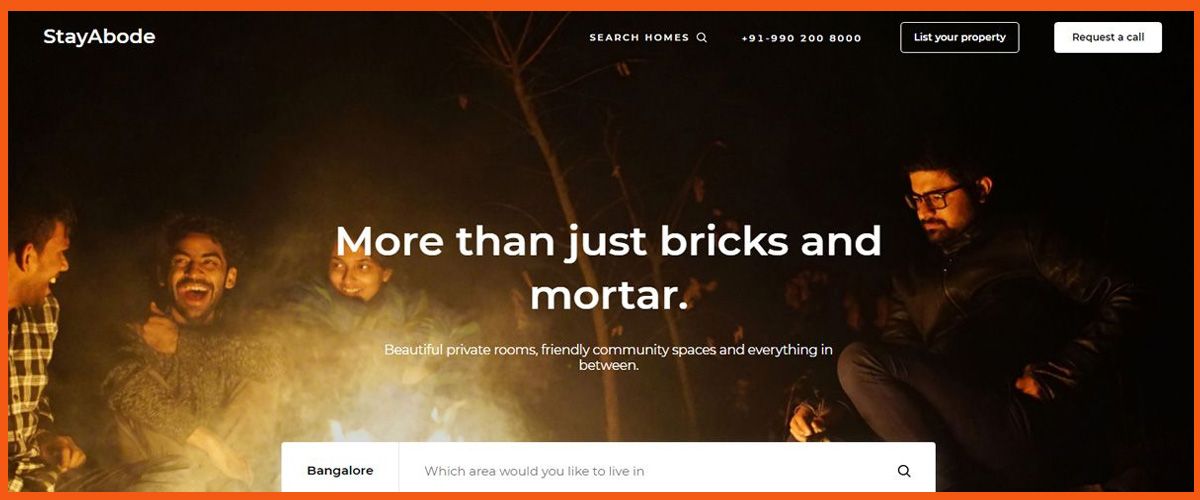When a student crosses the border of his domestic state into a foreign metropolitan city, he is nervous, curious, and anxious about how the new location and surroundings are gonna treat him. A young person often finds various ways to learn and grow from, many of them are harsh real-life situations. But his rented accommodation shouldn’t be one of them as well. Peaceful and friendly living space is what we all want and look for. But sadly, it isn’t always the case. Rude landlords, unaffordable PGs, restrictions, an inspection of locality, distance and so many more factors together give us a picture to make decisions upon. Here, Grexter comes to your solution.
In the last decade, the definition of renting has significantly changed. Grexter Living was established by Pratul Gupta & Nikhil Dosi, with the simple idea of changing the way youngsters live in India. They aim to eliminate the key problems that plague the rental accommodation sphere by providing state-of-the-art, fully-managed, and affordable co-living spaces. Committed to revolutionizing the renting space, Grexter offers end-to-end housing solutions to students and working professionals in Bangalore.
Get an Insight on Grexter Living Company Profile, Competitors, Business Model, Funding, Founders, Growth etc.,
Company Highlights
| Startup Name | Grexter Living |
|---|---|
| Headquarter | Bangalore |
| Founder Name | Pratul Gupta and Nikhil Dosi |
| Sector | Co-living |
| Founding Year | 2016 |
| Registered Entity Name | Grexter Housing Solutions Private Limited |
About Grexter and how it works
Founders of Grexter and Team
How was Grexter Started
Grexter – Launching
Grexter – Name and Logo
Grexter – Business Model
Grexter – User Acquisition
Grexter – Funding and Investors
Grexter – Startup Challenges
Grexter – Competitors
Grexter – Funding and Investors
Grexter – Future Plans
Grexter – FAQs
About Grexter and How it Works
Grexter Living offers functional and built-to-suit urban studio rooms that provide all the necessary amenities and, at the same time, are aesthetically appealing. Catering primarily to salaried employees, fresh graduates, and techies in the age group of 18-30 years, the spaces they provide consist of a large common kitchen with another huge designated area that has lounges, gaming consoles, and home theaters.

All you need to do is go to Company’s website and select the co-living space closest to your workplace or college. Once you have selected the space you can schedule a visit on a particular date and time. During this visit, someone from their team will show you the room as well as the common spaces on their property. If you like it then you can book the place. Once the booking is done, you just need to show up on the date of your move-in along with your luggage. Rest is taken care of by the team.
Founders of Grexter
Pratul Gupta and Nikhil Dosi are the co-founder of Grexter Living.
Pratul and Nikhil befriended each other at a cultural event, and straightaway realized that they shared an inclination towards entrepreneurship.
Pratul facilitates the growth of the business by shouldering the responsibility of business development and managing the entire product and strategy. A B.Tech graduate in Chemical Engineering from the esteemed IIT Madras, Pratul worked for nearly 4 years in investment banking with stints at Credit Suisse and Deutsche Bank after graduating in 2011. He then joined a venture capital fund called Acumen for a brief period.
Equipped with the insights he gained throughout his professional sphere, he aims to make it the biggest provider of co-living spaces for youngsters across the top 8 tier I cities of India.
Nikhil graduated in chemical engineering from IIT Madras in 2013 and worked for Reliance before deciding that he had to reconnect with his friend and embark upon building a business.
How was Grexter Started
In the year 2015, Pratul was working with a venture capital fund called Acumen which is based out of Mumbai. During his stint there, he worked on an investment deal for a PG accommodation provider. While Working on that deal, Pratul studied the rental housing market of India in detail. This coupled with his own struggles of finding good accommodation in Mumbai made him realize that he is supposed to work on this and solve this problem, not only for his own self but for millions of Indian youngsters like him.

Grexter – Launching

Grexter decided to operate from Bangalore as the city has a very cosmopolitan nature. With rapid urbanization and an increase in population, it is amongst the fastest-growing cities in India. Every year, lakhs of young adults migrate to Bangalore for better career prospects. Unfortunately, a majority of them are forced to stay in cramped PGs without having access to basic facilities. Grexter wanted to address these issues by providing them with affordable yet quality co-living spaces at prime locations. For company, marketing was never a priority, they focused on making a product that speaks for itself.
Co-Living – Market and Industry Details
India’s co-living segment has huge growth potential. According to the latest projections by RedSeer Consulting, the domestic co-living market will be worth more than 2 billion USD by 2022. The number indicates the increasing demand for tech-enabled co-living facilities in the country. According to a survey, over 50 percent people in the age group of 18-35 years are willing to rent co-living spaces and pay up to Rs 15,000 a month in top Indian cities including Delhi NCR, Mumbai, and Bengaluru. Although the concept of co-living is more popular in the metro cities, it has started to catch up with the residents of tier II and tier III cities as well.
Grexter – Name and Logo
The term Grex is derived from the Latin noun ‘grex’ meaning ‘flock’. The co-living company builds inclusive surroundings for youngsters who come together to live with them, their community symbolizes the flock that sticks together no matter what. Grexter is a representative of the flock it belongs to. They added the word ‘living’ to Grexter to explain their offering better – living spaces for the young.

Company’s logo has 3 circles – the smallest one on the outside represents the tenant, the bigger inclusive one represents the surrounding, which the tenant is just about to enter, while the center circle represents his private zone which is his own personal space amidst the larger community. The whole combination also looks like a “G” representing Grexter.
Grexter – Business Model and Revenue Model
Grexter works on operator model in which they sign buildings with minimum 100 beds capacity by entering into a long-term lease with the owner of the property. They promise a minimum rental plus a revenue share with the owner. After adding operating cost and margins they rent these beds to the end-user at a competitive market price.
Grexter – User Acquisition and Growth
Grexter not just provide a place to live but each one of their building is designed to connect and inspire people. Their living spaces foster human connection and enable people to lead more fulfilling lives. From common areas and designated game zones consisting of the foosball table, table tennis table to weekly events such as Karaoke night, poetry & storytelling night, Yoga sessions and much more, the co-living startup try their best to keep the tenants entertained by giving them a chance to socialize and forge connections. The cultural activities and events are ever-changing and bespoke to each location. That’s what differentiates Grexter Living from other co-living spaces and has worked from the very start to attract people.
It currently operates in 21+ Locations across Bangalore has 2200+ beds and 3000 beds in the upcoming 6 months. Their Current Annual Revenue rate is of INR 19.2 crores and an occupancy of 95% at mature locations.
Grexter Living Acquihired i2Stay. It will expand the scale of operations of the combined entity and also enable it to move into new cities. i2Stay provides affordable accommodation targeted at working professionals. As part of this deal, Rajasekhar Gowrineni, CEO of i2stay, joined the team as the Managing Partner for South India.
“We are extremely happy to welcome Rajasekhar on-board. Rajasekhar has been a pioneer in space-saving concepts, and through this partnership, we will be able to leverage his expertise and years of experience. We are already working on some really innovative co-living design ideas and hope to bring them to life very soon” Said Pratul Gupta, Co-Founder, Grexter Living.

Grexter – Funding and Investors
Grexter Living had raised a Pre-Series A investment worth $1.5 million (INR 10.6 Cr) from Venture Catalysts earlier this year.
This funding helped us to scale up our operations and strengthen the underlying technological framework.
Key Investors include – Apoorva Ranjan Sharma (Founder, Venture Catalysts First Investor in OYO), Anuj Munot (Director, Kalpataru Group), Abhishek Bhatewara (Director, Rohan Builders), Naveen Garg (Ex – B2B head, PNB Housing), Anuj Golecha (Samyakth Group) and Siddharth Kothari (Om Group)
Grexter – Startup Challenges
The most challenging part for this co-living startup was to find a good quality supply i.e. properties. To overcome this, the company has partnered with various real estate developers. They also have some of the top developers of the country as their investors. It has created a think tank within the company which is helping them acquire the best properties in the most prime areas of the country.
Grexter – Competitors
StayAbode, Stanza Living, Colive, NestAway, Zolo, Coho, OYO Life are some of it’s competitors in the industry. What makes Grexter Living different is the fact that it endeavors to create true co-living communities by charging all-inclusive rent for studio rooms that are new-age and transparent in resident policies.
There are quite a lot of competitors in the market for Co-living spaces but the aspect of affordability is one of the key USPs of Grexter Living. The rent for a double-sharing room starts at INR 9,000, where single room rents start from INR 16,000 (including utility charges and maintenance). They see co-living as a platform for people’s life for becoming the best self by being part of something bigger. For sharing space, skills, resources and dreams with other inspiring and creative people. For living a life on purpose.
Grexter – Future Plans
Grexter plans to increase their citywide footprint to 5,000 beds by the end of 2019. They are also looking to expand their operations into Pune and Hyderabad in 2020, and have 20,000 beds in their inventory.
Grexter – FAQs
Who are the Founders of Grexter Living?
Pratul Gupta and Nikhil Dosi founded Grexter Living in 2016.
How much is Grexter Living Funding?
Grexter Living raised a Pre-Series A investment worth $1.5 million (INR 10.6 Cr) from Venture Catalysts in 2019.
Who are the Key Investors in Grexter Living?
Apoorva Ranjan Sharma (Founder, Venture Catalysts First Investor in OYO), Anuj Munot (Director, Kalpataru Group), Abhishek Bhatewara (Director, Rohan Builders), Naveen Garg (Ex – B2B head, PNB Housing), Anuj Golecha (Samyakth Group) and Siddharth Kothari (Om Group).
Who are the Top competitors of Grexter Living?
StayAbode, Stanza Living, Colive, NestAway, Zolo, Coho, OYO Rooms are some of Grexter’s competitors in the industry.

















